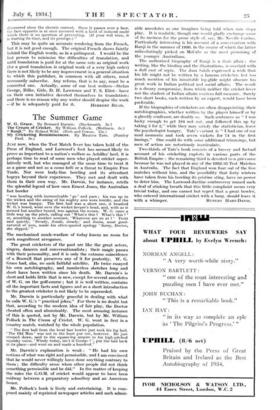The Summer Game
W. G. Grace. By Bernard Darwin. (Duckworth. 2s.) JUST now, when the Test Match fever has taken hold of the Press of England, and Larwood's foot has seemed likely to
prove as important to a nation's welfare as Achilles' heel, it is perhaps time to read of some men who played cricket super-
latively well, but who managed at the same time to treat it as a game and not as a cases belli or a threat to Empire Free Trade. Nor were body-line bowling and its attendant
bogeys beyond their experience. They met and dealt with them in their own way. Mr. Darwin, for instance, retells the splendid legend of how once Ernest Jones, the Australian fast bowler
" was bowling with inconceivable ' go ' and pace ; his run up to the wicket and the swing of his mighty arm were terrific, and the wicket was bumpy. The first ball was a short one, it brushed W. G.'s beard, went over the wicket-keeper's head, and, with as it seemed but another bound, was against the screen. W. G. came a little way up the pitch, calling out ` What's this ? What's this ? ' or, according to another account, 'Whatever are ye at ? ' Trott said quietly, ` Steady, Jonah, steady,' and Jones, most good- natured of men, made his often-quoted apology Sorry, Doctor, she slipped.' "
The mechanized mock-warfare of today leaves no room for such magnificent arrogance.
The great cricketers of the past are like the great actors, singers, dancers and conversationalists ; their magic passes with their personality, and it is only the extreme coincidence of a Boswell that preserves any of it for posterity. W. G. Grace had, alas, no such faithful satellite. He twice essayed his own autobiography, and numberless sketches long and short have been written since his death. Mr. Darwin's is short and holds little that is new, except for several anecdotes of W. G. on the golf-coarse ; but it is well written, contains all the important facts and figures and as a short introduction to the greatest cricketer is not likely to be superseded.
Mr. Darwin is particularly graceful in dealing with what he calls W. G.'s " practical jokes." For there is no doubt but that, according to the modern idea of fair play, the Doctor cheated often and abominably. The most amusing instance of this is quoted, not by Mr. Darwin, but by Mr. William
Pollock in The Cream of Cricket. W. G. went in first in a country match, watched by the whole population.
" The first ball from the local fast bowler just took his leg bail. The Old Man' was not in the least put out, however. He just stooped down, said to the square-leg umpire in his high-pitched squeaky voice, Windy today, isn't it George ? ', put the bail back in its place—and went on and made a hundred."
Mr. Darwin's explanation is weak : " Ile had his own notions of what was right and permissible, and I am convinced that he would never willingly have done anything contrary to them ; the difficulty arose when other people did not think something permissible and he did." In the matter of keeping
the rules the G.O.M. of cricket would appear to have been midway between a preparatory schoolboy and an American boxer.
Mr. Pollock's book is lively and entertaining. It is com- posed mainly of reprinted newspaper articles and such admir- able anecdotes as one imagines being told when rain stops play. It is readable, though one would gladly exchange some of its raciness for the prose style of, say, Mr. Neville Cardus. Particularly interesting is his account of a conversation with Ranji in the summer of 1930, in the course of which the latter unhesitatingly picked on McCabe as the most promising of the younger Australians.
The authorized biography of Ranji is a drab affair ; the writing, like the binding and the illustrations, is overlaid with a dull cast of sepia. The Jam Sahib expressed a wish that his life might not be written by a famous cricketer, lest too much mention of his inimitable leg-glide might obscure his great work in Indian political and social affairs. The result is a dreary compromise, from which neither the cricket-lover nor the student of Indian affairs receives full measure. Surely two short books, each written by an expert, would have been preferable.
If the biographies of cricketers are often disapPointing, theii autobiographies, whether written by the play6r himself or by a ghostly confessor, are doubly so. Such sentences as " I was lucky enough to get 184 not out, and followed this up by taking 5 for 2," while they may satisfy the statistician, leave the psychologist hungry. Tate's variant is " I had one of my mad moments and took seven wickets for 74 in the first innings." One could do with some additional trimmings, but men of action are notoriously inarticulate.
Two-thirds of Tate's book consists of a breezy and factual account of his cricketing exploits in various parts of the British Empire : the remaining third is devoted to a grievance because he was not played in any of the 1982-33 Test Matches in Australia. The fact that England won four out of the five matches without him, and the possibility that forty winters have taken from his bowling its pristine sting, have no power to deter him. The Larwood-Jardine controversy roused such a deal of stinking breath that this little complaint seems very trivial today, and one cannot but regret that a great bowler, who entered international cricket with a bang. should leave it










































 Previous page
Previous page